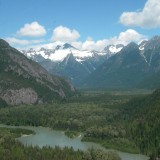The Harper Government plans to further roll back the historic Navigable Waters Protection Act in this year’s omnibus budget bill. The new proposed changes to the Act follow serious cuts made in the 2009 budget, which included eliminating most environmental assessments based on navigable waters triggers and setting up a two-tier system separating waterways deemed worthy of protection from the vast majority which are not.
These new changes go even further. Based on the amendments included in this year’s 443-page budget bill, just 62 rivers and 97 lakes would enjoy the protection of the newly named Navigation Protection Act.
The Government isn’t hiding its intention with these changes, as Minister of Transportation Denis Lebel noted yesterday they could eliminate red tape for companies seeking to build mining and energy projects.
On CBC’s Power and Politics yesterday, Conservative pundit Tom Flanagan argued the new changes revert to the original spirit of the Act at its inception in 1882, namely to protect commercial navigation in major waterways, such as the St. Lawrence Seaway. But the principles upon which the Canadian Navigable Waters Protection Act were founded date back much further, to the Maga Carta and even Roman laws.
The Act historically balanced the right of navigation with rights to obstruct navigation through projects like bridges, pipelines, mines and other industrial impacts – but the process involved an environmental assessment which applied to any navigable watercourse. The 2009 amendments to the Act set up the principle of different classes of navigable waters and cut out the environmental assessment process, leaving the decision squarely in the hands of the transport minister. This latest gutting of the Act reduces the list of protected watercourses even further.
Environmental critics have been quick to attack the proposed changes. Keith Stewart of Greenpeace noted, “There are a lot of rivers not on the list that are used by Canadians and need to be protected.”
Green Party Leader Elizabeth May connected the changes to the Act to the long list of cuts to environmental protections and regulatory processes included Harper’s last omnibus budget bill. “The destruction of the Navigable Waters Protection Act and renaming it the Navigation Act is part of a consistent pattern of Stephen Harper trying to remove federal constitutional authorities for the environment.”
First Nations leaders also voiced their concerns. Chief Allan Adam of the Athabasca Chipewyan First Nation, in the midst of the Alberta Tar Sands, had this to say: “I am seriously concerned this is an indication of corruption in our current government. We hope there will be a public outcry that echoes our sentiment. After all, we all share the responsibility to protect mother earth.”


I arrived in BC in 1951. My first job was counting trees for the BCFS.
Family and friends back home were awe struck by the photos and tales I sent home. Back then BC was truly Beautiful British Columbia.
But . . . but . . . but . . . even then this naive kid from Yorkshire had forebodings.
The wanton destruction I witnessed on the logging operations and camps I work closely with caused me much consternation.
I had just come from war torn England: hell we even saved the dinner table scraps for the pig bin.
I remember even then, amidst taunts of, “if you don’t like it go back to where you came from” were more than disturbing because I used to think, “this cannot go on!”
And indeed it cannot!
And here we are!